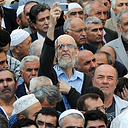John Coates and CAS or when the fox guards the henhouse
Australian John Coates is considered one of the most powerful and influential sports officials in the world. The scandal-ridden man is not only an IOC vice president, but also president of the Australian Olympic Committee and the World Court of Arbitration for Sport (CAS). Coates is among the few IOC members who can be described as Bach’s confidants. A man for all cases: He heads the coordination commission for the Corona Summer Games in Tokyo on Bach’s behalf — and he led the commission that drew up and presented the new Olympic allocation system in 2019. The very system that now benefits the city of Brisbane as host of the 2032 Games. What coincidences there are…..
Back to the CAS: here Coates, as president of the ICAS Foundation, is chief supervisor of the CAS in Lausanne. According to the Foundation’s own rules and regulations (…), the task of this foundation is “to facilitate the resolution of sports-related disputes through arbitration or mediation and to safeguard the independence of CAS and the rights of the parties. It is also responsible for the administration and financing of CAS.” (Art. S2)
A job creation measure for deserving officials
The fact is, however, that Thomas Bach intimate and bribe payer (Sydney 2000) Coates does not take conflicts of interest too seriously. As seen, the scandal-tested professional functionary heads, among other things, the IOC commission dealing with the 2021 Summer Olympics in Tokyo. At the same time, Coates is bidding with Queensland for the 2032 Summer Games. Such conflicts of interest characterize the Olympic galaxy.
And what about CAS ? CAS is by no means an independent body, because the sports court is dominated and financed by the IOC and the international sports federations. John Coates is the most important confidant of IOC President Thomas Bach. CAS rulings often enough reflect the interests of the IOC and international sports federations such as FIFA. The CAS thus remains an extremely questionable entity and is to a large extent a job creation measure for lawyers who are often connected to sports in very many functions (so-called honorary posts) and on very many different sides. CAS becomes thus not the pool of the most qualified, but rather a republic of buddies. This is how you keep the business going and things under control.
Conflicts of interest non-stop
There are several cases in which judges could theoretically have brought their personal interests into a case. The most impressive is the case of CAS judge Efraim Barak. From 2015 to 2017, he worked as an external consultant for the Israel Football Association on a dispute that was to be decided by FIFA. While he hoped for a ruling in favor of his federation here, however, he co-decided at CAS in at least four cases involving FIFA. Barak himself sees no conflict of interest in this. On request, the CAS succinctly stated that the parties concerned could have filed a request for recusal, which did not happen. Why ? This has to do with procedural psychology and statistics. The appealing party is afraid of upsetting the panel of judges at the beginning of the trial. On the other hand, appellants are aware of the low chances of success of such pleas before the CAS, as they are regularly rejected.
Let’s take another more recent example. The choice of chairman Rui Botica Santos (POR) in Manchester City v. UEFA (https://www.tas-cas.org/fileadmin/user_upload/CAS_Award_6785___internet__.pdf) also fits into this pattern of conflicts of interest. According to the CAS procedural code, the appealing party and the respondent each appoint an arbitrator, and the chairman of the panel is designated by the CAS. In this case, however, it was completely different: the appellant Manchester City not only designated an arbitrator, but also immediately proposed the chairman of the panel. You might wonder for what reason. Surprisingly neither CAS nor UEFA did…. Yet Botica Santos has corporate connections to the owners of Man City via his association with General Electric (GE) and their association with the Sovereign Wealth Fund of the UAE, Mubadala. What was that about the task of John Coates as supervisor of the CAS ? It is really like that and wanted by the IOC: the fox guards the henhouse.
